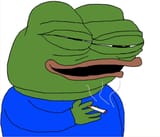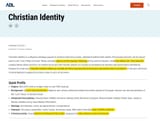>>513080139
This quote mining would be to say that the early Church were all heretics and somehow all the lights went out, so to speak, until the 1500s. That would put into question even the Church canon of scripture that was eventually received from them, because you would be saying that you got your scripture from heretics.
No matter your denomination, you'd agree with one point in Matthew 16. That being that the gates of hell will not prevail against it (the Church). The lights couldn't have just gone out to rekindle only during the reformation.
If you read these lines with a holistic understanding of how things went on in the early Church, in the very Churches the apostoles set up, to whom Paul sent letters to, where worship was conducted because most people couldn't read, and not with the protestant presuppositions, they're damning upon the reformation.
Just one example:
>"The teachers of Judaism refuse to admit that the [Septuagint] is correct. They attempt to frame another translation of the Scriptures. Observe that they have taken away many [Old Testament] Scriptures, by which the proof of Christ's crucifixion is set forth" - Justin Martyr, ca. 150 AD Dialogue with Trypho (Chapters 69-88)
>[Septuagint] because what he specifically writes is "the interpretation made by the seventy elders who were with Ptolemy [king] of the Egyptians"
>"[Old Testament] Scriptures" because he only refers to "Scriptures", but at this point in Church history the only piece of scripture accepted in totality by the believers is the Septuagint, the Old Testament.
The Septuagint having been quoted by St. Paul as well. Why would any protestant subject themselves to the Masoretic text, an Old Testament by Christ denying jews, used in their own bibles? Even this alone puts the entire reformation and their interpretations into question, since
>For such men are false apostles, deceitful workers, masquerading as apostles of Christ.
 8/15/2025, 4:33:07 AM
No.513079718
[Report]
>>513079747
>>513079803
>>513079823
>>513079893
>>513079905
>>513079996
>>513080139
>>513080219
>>513080265
>>513080274
>>513083140
>>513084068
>>513084447
>>513084524
>>513084581
>>513084854
>>513087038
>>513087141
>>513091126
>>513091459
>>513091569
>>513092146
>>513095612
>>513095800
>>513095846
8/15/2025, 4:33:07 AM
No.513079718
[Report]
>>513079747
>>513079803
>>513079823
>>513079893
>>513079905
>>513079996
>>513080139
>>513080219
>>513080265
>>513080274
>>513083140
>>513084068
>>513084447
>>513084524
>>513084581
>>513084854
>>513087038
>>513087141
>>513091126
>>513091459
>>513091569
>>513092146
>>513095612
>>513095800
>>513095846












